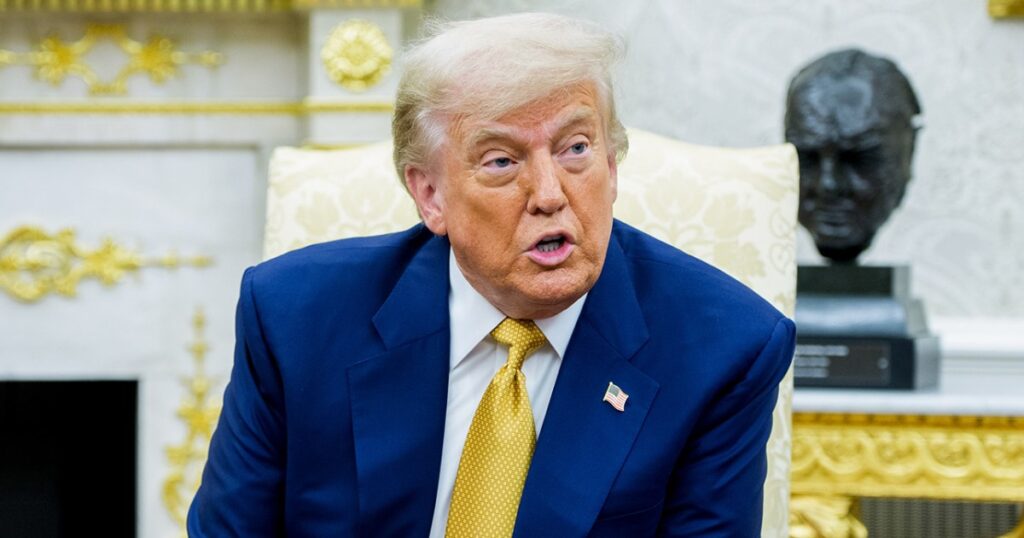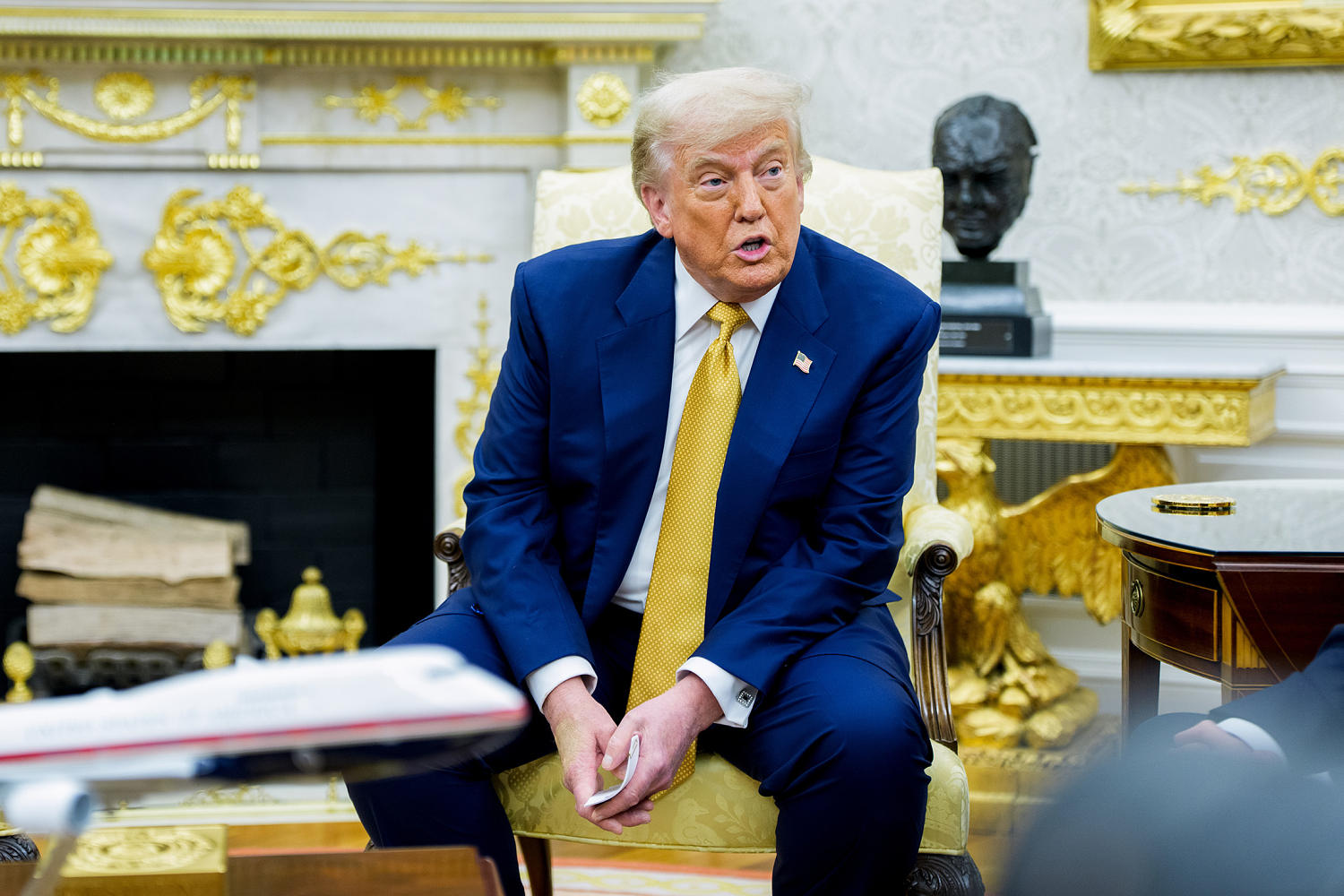

Welcome to the online version of From the Politics Desk, an evening newsletter that brings you the NBC News Politics team’s latest reporting and analysis from the White House, Capitol Hill and the campaign trail.
In today’s edition, Scott Bland breaks down new poll numbers that show the world’s views shifting on China and the economy. Plus, Sahil Kapur examines how Republican members of Congress are hate-voting for certain pieces of legislation.
Sign up to receive this newsletter in your inbox every weekday here.
— Adam Wollner
As Trump pursues his trade agenda, other countries’ views shift on ties with China
Analysis by Scott Bland
President Donald Trump’s first year back in the White House has coincided with some sharp changes in allied countries’ assessments of the importance of Chinese economic ties.
That’s according to new data from surveys conducted in 25 countries by the Pew Research Center. Pew notes that the changing attitudes also reflect a rebound from low points in the immediate aftermath of the Covid-19 pandemic, which began in China.
But the data also demonstrates how Trump’s presidency and his trade agenda have sharply shifted public opinion in other nations — shifts that could have far-reaching effects for years.
In particular, Pew asked whether it was more important for each country surveyed to have close economic ties with the U.S. or China. Generally, the share of respondents choosing China has grown in recent years, while the United States’ share has shrunk. But two nations in particular stand out.
There’s Australia, which this week is hosting military exercises meant to signal strength against China. This year, Australian respondents said 53%-42% that having closer economic ties with China is more important. Four years ago, that was reversed — 52%-39% toward the U.S.
And then there’s Mexico, one of the biggest U.S. trading partners. Mexican survey respondents have long recognized the importance of the trade relationship with the U.S., but amid the back-and-forth on tariffs this year, they split on whether ties with the U.S. or China were more important.
These opinions have shifted over time, and there’s no telling where they’ll go in the future. But as the U.S. tries to shift its trade policy and tries to counter China geopolitically, these surveys offer some early evidence of backlash in one realm that could affect the other.
Republicans keep voting for bills they say they don’t like
By Sahil Kapur
There’s a new trend in Congress that has emerged in President Donald Trump’s second term: Republican lawmakers across the ideological spectrum keep voting for bills they have publicly criticized.
In some cases, GOP members of Congress have explicitly threatened to vote “no” on bills they say are deeply flawed before eventually folding and voting “yes.” In others, they warn bills they have voted for will require fixing down the road.
A few notable examples:
Medicaid: Two weeks after voting to pass a sweeping domestic policy bill that cuts Medicaid by about $1 trillion, Sen. Josh Hawley, R-Mo., introduced a bill to repeal some of those cuts.
“Now is the time to prevent any future cuts to Medicaid from going into effect,” Hawley said in a statement.
Hawley said he feared the party’s megabill would cause long-term harm if the Medicaid cuts are fully implemented, but still voted for it because it will deliver more hospital money for Missouri in the first four years.
“You can’t get everything you want in one piece of legislation. I like a lot of what we did. I don’t like some of it,” he told reporters after unveiling his own measure on Tuesday.
National debt: Nowhere has this dynamic been more pronounced than with the ultraconservative House Freedom Caucus, whose members have repeatedly threatened to oppose bills before acquiescing under pressure from Trump. With Trump’s megabill, they complained about red ink: It’s expected to add $3.3 trillion to the national debt over 10 years, according to the Congressional Budget Office.
“What the Senate did is unconscionable,” Rep. Ralph Norman, R-S.C., said in a Rules Committee meeting, vowing that “I’ll vote against it here and I’ll vote against it on the floor.” He ultimately voted for that bill, unamended, after conservatives were told Congress would consider future bills to lower the debt.
Rescissions: And in the run-up to the votes on a package to cancel $9 billion in previously approved funding for foreign aid and public broadcasting, several Republicans expressed serious concerns with its substance, its deference to the executive branch and the damage it could do to bipartisan dealmaking on government funding in the future.
“I suspect we’re going to find out there are some things that we’re going to regret. Some second- and third-order effects. And I suspect that when we do, we’ll have to come back and fix it,” said Sen. Thom Tillis of North Carolina, before voting in favor of the bill.
Bottom line: It isn’t unusual for lawmakers to back legislation they call imperfect. But this year, that contrast has become more stark. It comes as Trump has solidified his grasp over the GOP base, resulting in lawmakers growing increasingly leery of crossing him and risking their political futures.
Read more from Sahil →
✉️ Mailbag: Could Democrats undo the ‘big, beautiful bill’?
Thanks to everyone who emailed us! This week’s reader question is on the future of the megabill President Donald Trump signed into law.
“If the Democrats gain control of both chambers of Congress how much of the Republicans bill can they change?”
In theory, Democrats could change much, if not all, of what’s in the new tax cut and spending law if they were in power in Washington, using the same party-line “budget reconciliation” process Republicans just utilized. But they won’t be in that position for a while — and they may not want to completely do away with the sweeping package.
Let’s start with the first point. Given Republicans’ tiny majority in the chamber and the usual headwinds the party in power faces during a midterm, Democrats have a good shot at winning the control of the House next year. But the Senate is a different story. As we’ve written, Democrats face an uphill climb to the majority in 2026, and the 2028 map doesn’t look much more favorable, with the number of states splitting their presidential and Senate tickets dwindling.
Then of course, even if Democrats manage to take control of both chambers of Congress, they won’t have an opportunity at the White House until 2028.
As for the second point, there are a lot of aspects of the “big, beautiful bill” Democrats would like to reverse, most notably the cuts to Medicaid and food assistance programs. But there are others, such as “no tax on tips,” that have garnered support from Democrats.
And while Democrats support increasing the current tax rates on the top earners, they wouldn’t want the 2017 tax cuts that the law extends to completely expire. That would mean tax hikes on middle- and lower-income Americans, too.
🗞️ Today’s other top stories
- ✉️ Epstein fallout: Trump took legal action less than 24 hours after The Wall Street Journal published an article saying Trump sent a letter to Jeffrey Epstein in 2003 that included a drawing of a naked woman. The Justice Department also filed a motion to unseal grand jury transcripts related to Epstein and Ghislaine Maxwell’s criminal case in Manhattan federal court.
- 📻 Stations in limbo: After Congress approved a package to cut funding for PBS and NPR, media advocates fear that local public broadcasters will be forced to downsize or shutter, which could have an outsize impact on rural areas. Read more →
- 🩺 Health care hikes: People who get health insurance through the Affordable Care Act could soon see their monthly premiums sharply increase as subsidies expire and insurers propose a major premium hike for 2026. Read more →
- 🪙 Crypto crunch: Trump signed the GENIUS Act, the first piece of federal legislation regulating stablecoins, a form of cryptocurrency, into law after it passed through Congress with bipartisan support. Read more →
- 🤠 Texas two-step: Democratic National Committee Chair Ken Martin was set to travel to Houston today to meet with Texas Democrats to discuss how to fight back against Republican efforts to redraw the state’s congressional maps. Read more →
- 🌴 Palmetto State dispatch: In conversations with more than a dozen Democrats across the South Carolina, a key presidential primary state, two themes emerged: They want someone ready to “fight,” but they also want someone who can appeal across party lines. Read more →
- 🎥 End of an era: “The Late Show with Stephen Colbert” will broadcast its final show in May, CBS said, adding that it’s not continuing the franchise. Read more →
- Follow live politics updates →
That’s all From the Politics Desk for now. Today’s newsletter was compiled by Adam Wollner and Dylan Ebs.
If you have feedback — likes or dislikes — email us at politicsnewsletter@nbcuni.com
And if you’re a fan, please share with everyone and anyone. They can sign up here.
 Latest World Breaking News Online News Portal
Latest World Breaking News Online News Portal






